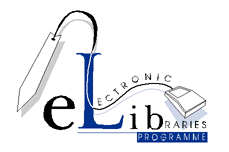The Electronic Stacks Project
A Logic Community, Journals and a Dictionary on the Net
- Project web site (address changed November 1998)
- http://www.dcs.kcl.ac.uk/journals/stacks/
- Programme area
- Electronic Journals
Contact Details
Dov M Gabbay
Department of Computer Science
King's College
Strand
London WC2R 2LS,
UK
Email: dg@dcs.kcl.ac.uk
Phone: +44 171 873 5090
Fax: +44 171 873 2851
Jane Spurr (Administrator)
Department of Computer Science
King's College
Strand
London WC2R 2LS,
UK
Email: jp@dcs.kcl.ac.uk
Phone: +44 171 873 2987
Fax: +44 171 873 2851
Chris Hankin
Department of Computing
Imperial College
180 Queen's Gate, Room: 428.
London SW7 2BZ, UK
Email: clh@doc.ic.ac.uk
Phone: +44 171 594 8266 (Direct Dial)
Fax: +44 171 594 8301
Howard Barringer
Department of Computer Science
University of Manchester
Oxford Road
Manchester M13 9PL, UK
Email: howard@cs.man.ac.uk
Phone: +44 61 275 6154
fax: +44 61 275 6204
Project description
as of January 4th 1996
Aim of the Project
The aim of this project is to take initial steps to establish a distributed, evolving and live electronic dictionary of logic, serving an active community on the subject. Logic is an interdisciplinary subject. Its long tradition, since Aristotle, is to provide foundations for problems in Philosophy, Mathematics, Language, Psychology, and more recently, Computer Science and Artificial Intelligence.
In the early 1980s, it became clear to many members of the research community that there were many similarities in the way logic is used and applied by the diverse existing active consumer communities. There was an urgent need to bring these communities together and to establish means for their communications and, hopefully, their collaboration.
Historical Background
A series of handbooks of logic was planned and published during the 1980s, covering in a thematic and cooperative way, many of the research areas of logic. By the early 1990s over 12 volumes of the handbooks were published with plans and activity for 25 more to be completed by the end of 2001. The intensive collaborative work of many scientists on these handbooks helped create an active community of logic, of many people well attuned to one another. It was therefore a natural step to establish, in the early 1990's, an electronic network and an electronic journal to serve the community. The community, known as The International Interest Group for Pure and Applied Logic (the IGPL), now has over a 1,000 members from 34 countries. The Journal of the IGPL is well known and is highly regarded and is now publishing vol. 3, issue 5.
Key Deliverables
The current project is to exploit the bond in the existing community together with existing achievements and to develop the ELECTRONIC DICTIONARY OF LOGIC. The dictionary is intended as an evolving, distributed, live body of logic entries residing on the world wide web and continuously maintained by the community. The project will get the dictionary started and establish the procedures, means and tools for its maintenance and all aspects of its existence and evolution, both social and electronic.
The Dictionary is further intended to be an electronic interface to the body of knowledge accumulated in almost 40 volumes (20,000 pages) of handbooks of logic, which will be available in electronic form by the year 2001. This we call the ELECTRONIC COMPANION TO LOGIC.
We shall develop the software for maintaining the logic dictionary as general purpose software for developing electronic databases of scientific information. These databases provide their information via the world wide web and they are maintained via the web. Each database grows dynamically by inserting new entries via the web. However, the contents are monitored and refereed by a number of editors, usually experts for certain fields. This combines the advantages of the distributed nature of the web and the high standards of refereed scientific journals.
We want to achieve two main goals. First of all, the system should enable every user of the web to find particular scientific information as quickly as possible, just by some mouse clicks and by typing in some keywords in a standard web browser. The information found should be as reliable as the information in refereed journals. The second goal is to organize the maintenance and growth of the dictionaries in such a way that no central authority is needed. Once an (initially empty) dictionary is set up, the main editor employs experts of particular areas to monitor the entries of their area. These editors may then employ further experts for subareas etc. Everybody who feels competent or who gets invited by an editor can write entries for the dictionary. The system supports that these entries get refereed by the corresponding editor and finally integrated into the dictionary.

